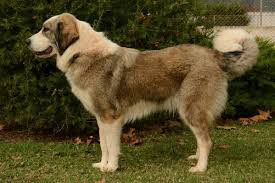
Greek Shepherd
Conditions of detention
Greek Shepherds are best suited to rural or suburban environments where they have plenty of space to roam and exercise. They thrive in outdoor settings and are not well-suited for apartment living.
Useful Fact: These dogs are highly adaptable to harsh weather conditions, making them ideal for outdoor living in various climates.
Nutrition and diet
A balanced diet of high-quality dog food, suitable for their age, size, and activity level, is essential for the Greek Shepherd. Their diet should support their active and hardworking lifestyle.
Useful Fact: Dividing their daily food intake into two meals can help maintain their energy levels and support healthy digestion.
Health
Greek Shepherds are generally healthy, robust dogs but can be prone to conditions such as hip dysplasia and bloat. Regular exercise and a balanced diet are crucial for their well-being.
Useful Fact: Regular veterinary check-ups and maintaining an ideal weight are essential to prevent and manage potential health issues.
Grooming and care
The Greek Shepherd has a thick double coat that provides protection against harsh weather. Their coat can vary in length and color, often being white, black, brown, or a mix. Grooming requires regular brushing to remove loose hair and prevent matting.
Useful Fact: These dogs shed seasonally, with heavier shedding periods twice a year, during which more frequent brushing is necessary.
Education and training
Greek Shepherds are intelligent and independent, requiring firm and consistent training. Positive reinforcement methods work best, as they can be sensitive to harsh training techniques.
Useful Fact: Early socialization and obedience training are crucial to manage their protective instincts and ensure they are well-behaved around people and other animals.
Toys and entertainment
Greek Shepherds enjoy activities that engage their minds and bodies. Durable chew toys, interactive games, and tasks that simulate herding can keep them entertained.
Useful Fact: Engaging in activities that mimic their natural guarding and herding instincts can provide mental stimulation and prevent boredom.
Safety
A secure yard with a sturdy fence is important to keep Greek Shepherds safe, as their protective nature might lead them to wander while patrolling their territory.
Useful Fact: Given their protective instincts, Greek Shepherds should be introduced gradually to strangers to prevent territorial behavior.
Accessories
Durable collars, leashes, and harnesses are necessary for managing their strength. Comfortable, weather-resistant bedding and proper outdoor shelters are also beneficial.
Useful Fact: Reflective gear can enhance visibility and safety during nighttime patrols or walks.
Socialization
Early socialization with other dogs, animals, and people is crucial for Greek Shepherds to develop a balanced temperament. They are naturally wary of strangers due to their guarding instincts.
Useful Fact: Regular social interactions can help mitigate excessive protectiveness and promote a well-adjusted demeanor.
Travel and Transportation
Greek Shepherds generally adapt well to travel, especially if they are used to car rides from a young age. Adequate space and secure travel crates are important for their comfort.
Useful Fact: Using a dog seat belt or travel crate can enhance safety during transportation
Behavior and psychology
Known for their loyalty and protective nature, Greek Shepherds form strong bonds with their families. They are independent thinkers and require mental and physical stimulation to stay happy.
Useful Fact: Regular exercise, mental challenges, and a clear role within the family structure contribute to their overall well-being and prevent behavioral issues.
Legal aspects
Owning a Greek Shepherd may be subject to local pet laws and regulations, including licensing and leash laws.
Useful Fact: Familiarize yourself with local regulations to ensure responsible pet ownership and avoid legal issues.


